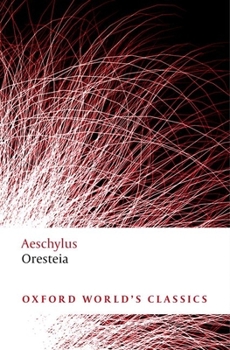Book Overview
The Oresteia is the only trilogy of tragedy plays to survive from Ancient Greece. Agamemnon, Libation Bearers, and Eumenides have established the enduring themes of Greek tragedy--the inexorable nature of Fate, the relationship between justice, revenge, and religion. In this family history, Fate and the gods decree that each generation will repeat the crimes and endure the suffering of their forebears. When Agamemnon is murdered by his wife, Clytemnestra, their son Orestes must avenge his father's death. Only Orestes' appeal to the goddess Athena saves him from his mother's Furies, breaking the bloody chain; together gods and humans inaugurate a way of just conduct that will ensure stable families and a strong community. About the Series: For over 100 years Oxford World's Classics has made available the broadest spectrum of literature from around the globe. Each affordable volume reflects Oxford's commitment to scholarship, providing the most accurate text plus a wealth of other valuable features, including expert introductions by leading authorities, voluminous notes to clarify the text, up-to-date bibliographies for further study, and much more. The Oresteia is majestic as theater and as literature, and this new translation seeks to preserve both these qualities. The introduction and notes emphasize the relationship between the scenes, ideas, and language that distinguishes this unique work.
Format:Paperback
Language:English
ISBN:019953781X
ISBN13:9780199537815
Release Date:January 2009
Publisher:Oxford University Press
Length:320 Pages
Weight:0.55 lbs.
Dimensions:0.8" x 5.1" x 7.7"
Customer Reviews
3 ratings
I love this Orestia!
Published by Thriftbooks.com User , 16 years ago
Again, I compared many different Orestia's and fell in love with this one on Hackett by Meineick. It reads beautifully and easily and the drama and intensity is unmatched. You also get a believable sense of the characters, and the setting in this one. It is in my opinion the best modern version that can be most easily performable with no archai-sisms in the language. I always go with Hackett now that I've found some really excellent translations! Highly recommended.
An Interpretation, Not a Translation
Published by Thriftbooks.com User , 21 years ago
No, the translation is not literal. If you want a literal translation, buy something written by a professor of Greek. Hughes has a different goal. He¡¦s a poet who wants to interpret this ancient literature into an idiom that modern audiences can understand and appreciate. I wouldn¡¦t even call this a translation. Let¡¦s call it an interpretation and skip over the problem of accuracy. That being said, his interpretation is extremely good. The free verse is both powerful and extremely readable. By putting these stories into a more familiar medium, Hughes recaptures the horror of these plays. By modern standards, the latter plays (Choephori and Eumenides) aren¡¦t very dramatic. The main point is to watch the cycle of revenge play out to a conclusion. But the first play in the trilogy (Agamemnon) is close enough to modern taste to have a huge impact. I was very moved.
Orestes for the modern world
Published by Thriftbooks.com User , 25 years ago
As a professor teaching classics in Regents College Master of Liberal Studies Program, I am always looking for translations that will entrance my students and give them that sensation of the marvelous that many of them can find only in videos and MTV. Hughes' translation of "The Oresteia" is a perfect choice. Sure, there may be in some passages a lot more of Hughes than of Aeschylus, but if that's what it takes to reincarnate those ancient and bloody tragic figures, it's a price well worth paying. After reading this book, I think my students will see "The Sopranos" as just another soap opera.







